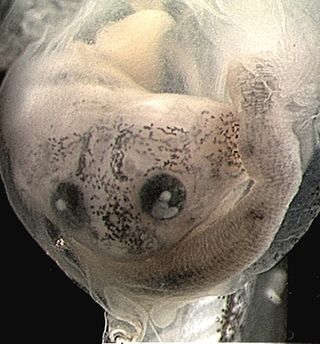Cannibal Tadpoles Could Reveal Gut Secrets

They may look fairly innocuous, perhaps just a little bloated, but Budgett's frogs are aggressive creatures with cannibalistic tendencies from the time they're just tadpoles.
Tadpoles are frogs in their young larval stages, and in most species, they're stuck with simple diets because their digestive tracts cannot process insects or proteins until they mature.
Budgett's frogs, meanwhile, have short complex guts that can break down protein from a remarkably early age. They swallow other animals whole, sometimes even eating their own siblings.
Researchers at North Carolina State University recently studied how this meat-eating ability evolved. The team looked at the algae-eating tadpoles of African clawed frogs (Xenopus laevis), which, 110 million years ago, had a common ancestor with Budgett's frogs.
By exposing embryos of African clawed frogs to certain gene-deactivating molecules, the researchers created tadpoles with guts that looked more like those of Budgett's frogs, fit to digest protein. Turning the technique on the embryos of a South American species of Budgett's frogs, Lepidobatrachus laevis, the researchers said they created tadpoles with stomachs more suited for a vegetarian diet.
"Essentially, these molecules are allowing us to tease apart the processes that play a key role in gut development," developmental biologist Nanette Nascone-Yoder said in a statement. These findings could shed light on organ development, with implications for humans.
"Understanding how and why the gut develops different shapes and lengths to adapt to different diets and environments during evolution gives us insight into what types of processes can be altered in the context of human birth defects, another scenario in which the gut also changes its shape and function," Nascone-Yoder added.
Sign up for the Live Science daily newsletter now
Get the world’s most fascinating discoveries delivered straight to your inbox.
Budgett's frogs aren't the only ones in the animal kingdom with early, sometimes deadly sibling rivalries. Shark embryos are known to cannibalize their littermates in the womb. Researchers recently found that the phenomenon is likely part of the struggle for paternity in utero, where babies of different fathers compete to be born.
The research on Budgett's frogs was detailed April 23 in the journal Evolution and Development.
Follow Megan Gannon on Twitter and Google+. Follow us @livescience, Facebook & Google+. Original article on LiveScience.com.
Most Popular




